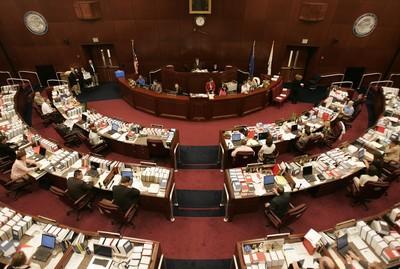Illegal worker bill passes

CARSON CITY — Bills to deal with companies that hire illegal immigrants and require the Nevada Tax Commission to deliberate and vote on tax decisions in public were signed into law Saturday by Gov. Jim Gibbons.
Under the provisions of Assembly Bill 383 the state can take action against companies that employ illegal workers, but not until the U.S. attorney general’s office has “made a final decision and entered an order” that Nevada businesses violated federal laws by hiring them.
Once that order is given, the state Tax Commission may impose an administrative fine against the employer if they find the business “willfully, flagrantly or otherwise egregiously” hired illegal workers.
The amount of the fine will be set at future Tax Commission hearings.
Under the version of the bill initially approved in the Assembly, the Tax Commission could have pulled the licenses of companies that hire illegal workers, if the federal government first determined they violated federal employment laws.
While the immigration provisions were watered down, AB383 also creates a new crime of “trafficking in persons for illegal purposes.”
A person convicted of smuggling illegal immigrants and using them as virtual slaves can receive a 20-year prison sentence under the law.
Assemblywoman Marilyn Kirkpatrick, D-North Las Vegas, and Attorney General Catherine Cortez Masto sought to add the trafficking provision to the bill.
Too often, people from Latin America, Russia and other counties are given promises of good jobs before being brought illegally to the United States and forced into prostitution or slavelike labor, Kirkpatrick said during an earlier interview.
Gibbons also signed Assembly Speaker Barbara Buckley’s Assembly Bill 433 that stipulates the Tax Commission can close meetings only to hear “proprietary or confidential information.” All other portions of the meeting must be conducted in public.
The bill arose from the Tax Commission’s decision to close a meeting in May 2005 and grant a $40 million tax refund to Southern California Edison for the operation of its Mohave Generating Station near Laughlin.
Under the new law, the commission first must determine in a closed session whether the information is proprietary or confidential.
If it is not, then the meeting must be opened.
“The principle underlying this legislation is that the public is entitled to transparency in the workings of its government,” said Buckley, D-Las Vegas, during a hearing on her bill.